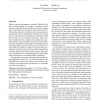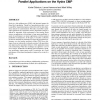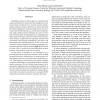76 search results - page 2 / 16 » A real system evaluation of hardware atomicity for software ... |
SPAA
2009
ACM
14 years 6 months ago
2009
ACM
Thread-level speculation (TLS) is a technique that allows parts of a sequential program to be executed in parallel. TLS ensures the parallel program's behaviour remains true ...
EUROSYS
2010
ACM
14 years 2 months ago
2010
ACM
Bugs in concurrent programs are extremely difficult to find and fix during testing. In this paper, we propose Kivati, which can efficiently detect and prevent atomicity violat...
ICS
1999
Tsinghua U.
13 years 9 months ago
1999
Tsinghua U.
Hydra is a chip multiprocessor (CMP) with integrated support for thread-level speculation. Thread-level speculation provides a way to parallelize sequential programs without the n...
ISCA
1999
IEEE
13 years 9 months ago
1999
IEEE
Sequential consistency (SC) is the simplest programming interface for shared-memory systems but imposes program order among all memory operations, possibly precluding high perform...
RTAS
2008
IEEE
13 years 12 months ago
2008
IEEE
Embedded systems are often subject to constraints that require determinism to ensure that task deadlines are met. Such systems are referred to as real-time systems. Schedulability...



